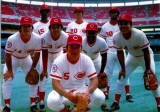I love this concept, but to follow James into the room, I need to know on what basis did he assign points? I would probably do something fairly simple...but objective...like make an initial estimate of expected win shares based only on the WAR trend in the previous three seasons (not the future...I'm pretending we're trying to project this player based on his previous work and his momentum) with an adjustment factor for the average change in value occurring by age.
That's entirely objective and not hard to do and it gets me into the room. James' points...maybe they tell you a neat story, but I need an explanation as to how he assigned them.
 ............
............
James wondered, "What was the most talented team, on paper, that ever went to spring training?" (The guys in the picture were the core of 9 of the 19 most talented rosters ever fielded.)
He asked, "What if we developed a method for asking not how many games did a team win, but how many games should they have won?"
Why would you want to know that?
Because, James said, there are a whole list of questions that can be asked through that approach that are totally invisible to the approach of looking at after-the-fact statistics.
How good was Lou Piniella, for example, as his teams performed relative to the talent that he had? Which was the most under-performing Mariners team? (Probably 1998.) Which was the most over-performing? (Certainly 2001). What are the characteristics of an over-performing team?
...........
James conceded that there is no way to know exactly how good the 1925 Yankees should have been. Every team before and after them, the entire decade, was great. That team, however, went 69-85. It under-achieved, but was it by 20 games, or 25, or 30, or 35?
But you can come up with reasonable answers, and if you get 100 of those reasonable answers on various questions, patterns can emerge. The Nazca lines aren't drawn precisely, but you can still make out the monkey, gentlemen.
His method? He came up with a complicated points system, to estimate the value of a player based on (1) who the player was, and (2) what age the player was in that year. He could have used WAR (actually Win Shares) the two years before and after, but he believed his system was better.
So, as he put it, you need reasonable estimates for all players in all eras, and his system gave approximations like this:
| Hank Aaron 1957 | 39 points |
| Reggie Jackson 1968 | 33 |
| Tom Brunansky 1987 | 18 |
| Ollie Brown 1966 | 11 |
| Ted Gullic 1930 | 2 |
As we know, Aaron > Jackson > Brunansky > Brown > Gullic. Now you're set.
If you had 25 Ollie Browns going into a 1973 season, you would expect to do worse than a team with 25 Reggie Jacksons, right? That's all Bill needed, in order to start finding reasonable answers to "which teams had the most and least talent?"
Other people, at this point, would "trip over the door sill and never get into the room." Immediately they would get bogged down in making the system more precise.
Bill, excited now, moved on to finding teams that over-achieved and under-achieved their talent, by the widest margins. I was excited too.
[Next]